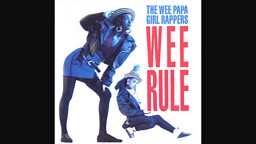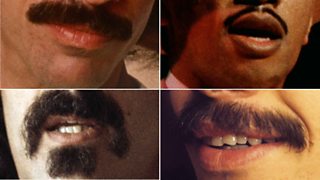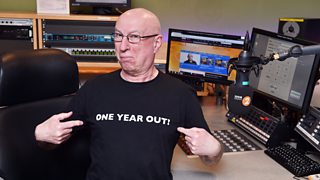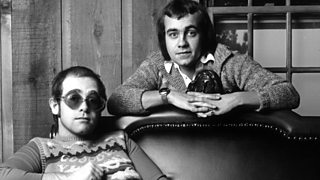7 of the weirdest tracks on 100 editions of Now (and what happened to the artists who released them)
By Alex Denney, 5 July 2018
For many teens, purchasing your first copy of Now That's What I Call Music! is a rite of passage on a par with passing your driving test or a fumbled first date at the cinema. The pop-compilation stalwart, which launched in 1983 celebrates its landmark 100th edition this month, is there to hold your hand through your first, formative forays into the charts.
Where else could you find Radiohead hobnobbing with Whigfield, or John Lennon joining Robson & Jerome in an unchained melody? Maybe you'd come for the Nik Kershaw and stay for The Smiths, as with the series' second edition, from 1984. Or maybe it was the other way around. Either way, the records made no distinction. Pop royalty shared space with one-hit wonders and leftfield interlopers in Now’s gloriously egalitarian vision, the one criteria being that they had to sell a shedload of records.
In this spirit of joyful inclusivity, we went in search of some of the weirdest songs to make it onto a Now compilation, pausing to consider what became of their makers...
-
![]()
Now That's What I Call Compilations
Presented by Gary Davies, with contributions from Westlife's Markus Feehily, Nadine Coyle from Girls Aloud, Ali Campbell from UB40, Kylie, Heaven 17, Limahl, Anne-Marie and more...
Will Powers - Kissing With Confidence (1983)
Bridging the gap between novelty record and conceptual-art piece, this curious entry in Now's first edition offers advice on kissing set to a breezy disco groove. "Is your breath fresh? Do you have spinach on your teeth?" asks Powers, leaving the listener to ponder if the song's new-agey exhortations are sincerely meant. In fact, Powers was the guru alter ego of rock photographer Lynn Goldsmith, who roped in A-list pals including Sting, Nile Rodgers and Carly Simon (featured here) for her one and only record under the alias, Dancing for Mental Health. "Some people are not comfortable with the idea of it not being absolutely clear if I'm serious about what I am saying as Will or if I am making fun of 'self-help'," Goldsmith told The Vinyl Factory 2015. "In some cases it makes them angry. My point as Will Powers is that it doesn’t matter what I mean or who I am. It matters who you are."
What happened next? Goldsmith, whose rock portraits were collected in a 2007 book, as the New York Times reported, left music to concentrate on her fine art photography, which has exhibited at the Smithsonian Museum and New York's Museum of Modern Art.
DNA featuring Suzanne Vega - Tom's Diner (1990)

Suzanne Vega sings Tom's Diner
Suzanne Vega sings her hit song Tom's Diner live at Maida Vale Studios.
Trip-hoppers DNA were threatened with legal action when Suzanne Vega's label discovered a white-label pressing the duo had made, based on the folk-rock singer's track Tom's Diner from 1981. But Vega was charmed by the Bath producers' effort when she heard it, agreeing to let them release it officially as a single, which sailed to number two in the charts in 1990. Oddly, the remix was only one of two afterlives that Vega's original enjoyed: long admired by audiophiles as a crisp recording of the human voice, the song was also used by German engineer Karlheinz Brandenburg to develop a new audio compression technology he was working on, leading Vega to be dubbed the Queen of MP3s.
What happened next? After the duo disbanded in 1998, Nick Batt went on to run the Sonic State music technology website and podcast. Neal Slateford helped to found an online sex toy shop in 2002. In an interview with Essential Retail last year, Slateford recalled an awkward brush with royalty when receiving a Queen's Award for International Trade in 2016. "I spoke to Prince Philip," he said, "who looked slightly stunned when I told him what we did and moved on swiftly."
Samim - Heater (2007)
The accordion techno smash no one knew they wanted, Swiss producer Samim's track made crushingly effective use of a sample from a 1950s Colombian cumbia to become an unlikely number 12 hit in 2007. "If you're a DJ, you've got a window of opportunity of maybe one more month to play this," wrote electronic music bible Resident Advisor in its review. "After that, you'll probably get things thrown at you." Tell that to Shaggy: the dancehall pop star turned the track into a Euro 2008 anthem, Feel the Rush, the following year.
What happened next? Samim is now a designer and "code magician" working at the frontiers of AI. In 2016, he produced a music video for the band Years & Years using Google's DeepDream, a programme that 'reads' imagery using algorithms to famously psychedelic effect.
Daphne & Celeste - Ooh Stick You (1999)

Insulting your mama, your daddy and your "greasy, greasy grandmammy" in one long string of high-pitched playground taunts, Ooh Stick You launched teenage terrors Daphne & Celeste on an unsuspecting UK public in 2000. An irresistibly daft update on the Hey Mickey's Platonic ideal of the novelty pop song, the track boasted what must surely rank as some of the most peculiar lyrics of all time ("In your ear with a can of beer / up your butt with a coconut", anyone?) and not one but two videos to match. Reflecting on their infamous appearance at Reading festival in 2000, which saw the pair bottled off-stage by revellers, Celeste revealed that her younger sister, who was in the crowd at the time, found comfort from an unlikely source after the incident brought her to tears. "You know who made her feel better?" she told i-D earlier this year. "Slipknot. They were laughing and making jokes, they were such nice guys."
What happened next? After stints working in TV and theatre (Cruz appeared in a 2009 episode of US sitcom 30 Rock), the duo returned this year with an acclaimed new album, Daphne & Celeste Save the World, recorded with leftfield producer Max Tundra.
White Town - Your Woman (1997)
A self-described straight-edge radical Marxist from Derby, Jyoti Mishri sparked a major-label scrum when his song Your Woman became a radio hit in 1997. He ended up signing with EMI, who dropped him after his debut album, Women in Technology, sank without trace. "I thought a major label would be full of fat, cigar-puffing men trying to scheme how to make money off me," Mishri told Dazed last year. "If only it were! Instead, it's just the most inept collection of bumbling fools you'll ever meet." Still, Your Woman retains its distinction as the first bedroom pop song to top the UK charts.
What happened next? Mishri continues to record under the White Town moniker, who are once again in the market for a female vocalist after a string of departures from the project. "It's like the thing about exploding drummers in Spinal Tap, but with singers," says Mishri.
Apache Indian - Boom-Shack-a-Lak (1993)

Apache Indian chats to Nihal
Nihal has Apache Indian on the phone for a chat and to ask some really strange questions.
Apache Indian is the originator of 'bhangramuffin' - a bizarre mash of Jamaican dancehall and bhangra-inflected beats that briefly went supernova with Boom-Shack-a-Lak, a No.5 hit in 1993. Born Steven Kapur to Punjabi parents in the late-60s, the singer grew up in Handsworth, a Birmingham suburb that poet Benjamin Zephaniah called "practically the Jamaican capital of Europe". Handsworth gave the homegrown ska and reggae scene many of its leading lights, including Steel Pulse, UB40, The Beat and Pato Banton - but Kapur brought a uniquely eastern flavour to tracks like Arranged Marriage and Chok There.
What happened next? In 2013, Kapur opened the Apache Indian Music Academy to help kids from the local community achieve their musical ambitions. His civic-mindedness extends to his songwriting career, too, with 2015 single Election Crisis released with the aim of bringing the youth to the polling booths.
Wee Papa Girl Rappers - Wee Rule

Perhaps the only rappers to publically boast of their GCSE French exam results, Wee Papa Girl Rappers were London sisters Sandra and Samantha Lawrence, a pair of former backing singers for Feargal Sharkey who signed with Jive Records. The 80s are not remembered as a golden age for UK hip hop, as the homegrown scene struggled to find an authentic response to the sounds coming out of the US - and Wee Rule, a No.6 hit in the autumn of 1988, is a novelty song at heart. But the track's pairing of schoolgirl rhymes with dancehall rhythms gives it an undeniably British twang. Imagine M.I.A. if she did children's parties.
What happened next? The duo, who sang on the theme tune to Jim’ll Fix It, disappeared from view after a second album for Jive, Be Aware, failed to catch fire.
Listen to the BBC Radio 2 documentary: Now That's What I Call Compilations
Like us on Facebook, on Instagram at bbcradio2, or follow us on Twitter @BBCRadio2














